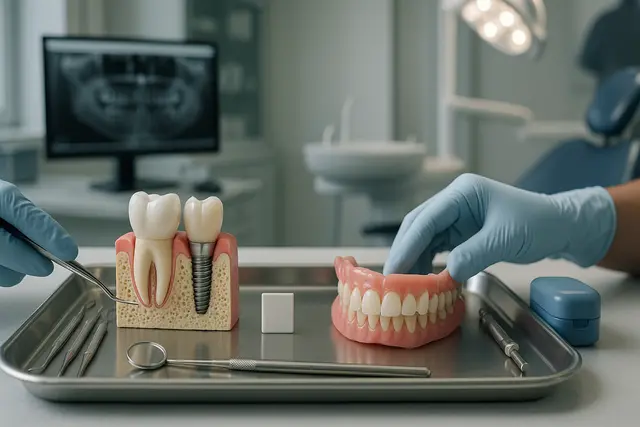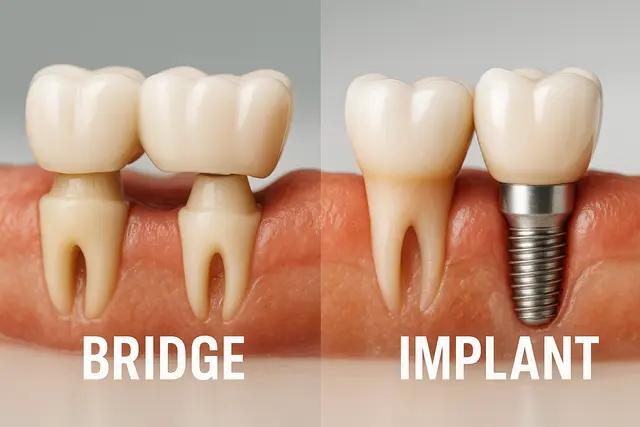Prosthodontics
5 min read
Aug 25, 2025
Who Does a Dental Implant? Understanding the Specialists Involved
Getting a dental implant isn’t just about replacing a missing tooth, it’s about restoring function, health, and confidence. But many people don’t realize that the procedure often involves more than one type of dental professional. Different specialists bring unique expertise to ensure the implant looks natural, feels secure, and lasts for years.

If you've got a gap where a tooth once lived rent-free, or several teeth have taken an early retirement, you’ve probably come across the term “dental implant.” It sounds pretty high-tech, and it is. But beyond the science and sparkle, the process of getting a dental implant is actually a team effort involving multiple dental superheroes. So, who exactly is qualified to perform your dental implant? And who should you trust with your smile?
The Role of the General Dentist in Your Dental Implant Journey
Your first stop? The general dentist. Whether it’s your longtime dentist or a new one you found after 2 a.m. Google spiral, they’re your gateway into the world of dental implants. Dentists assess your overall oral health, review x-rays, and decide if a dental implant is the right tooth replacement option for you.
If your dentist has advanced training in implant dentistry, they might perform dental implant procedures themselves, or they’ll coordinate your care with the right dental specialist. A good dentist will also walk you through treatment options and tell you honestly if your jawbone is ready for action or if it needs a little prep work first.
What a General Dentist Can Do With Dental Implants
General dentists are trained in a wide range of dental procedures, and many now take continuing education courses in implant dentistry. Some general dentists place dental implants themselves, especially when the case is straightforward, say, one tooth, healthy gums, good jawbone. They can also take impressions, make your crown, and help with the dental implant procedure.
But if things are more complex, bone is weak, gums are questionable, or you may need multiple implants, they’ll probably bring in some backup.
When a Surgical Procedure Calls for an Oral Surgeon
Now we’re talking about the heavy hitters. Oral surgeons, also known as oral and maxillofacial surgeons, are trained in serious surgical procedures involving the face, jaw, and mouth. If your case is a bit more “Houston, we have a problem,” the oral surgeon is your go-to.
From wisdom teeth to dental implant surgery, these pros are qualified to handle complex placements, perform bone grafts, and rebuild areas where the bone in your jaw is too thin or soft to support a dental implant. They also handle anesthesia, including general anesthesia, if you’re getting nervous just reading this. (No shame, this stuff is intimate.)
If you're looking for a dental implant that involves more than just a simple screw-in and crown setup, chances are the oral surgeon places your implant.
Periodontist vs. Oral Surgeon: Who’s Right for Your Gums?
A periodontist is the gum guru. Periodontists specialize in treating the gums and the bone structure that supports your teeth. If your dental problems stem from gum disease or poor gum health, they’ll step in before anything gets surgically placed.
Periodontists are also trained in dental implant surgery and often perform the procedure themselves, especially when the focus is on preserving or regenerating gum tissue around the implant.
The takeaway?
If the battle is mostly with bone, call the oral and maxillofacial surgeon.
If it’s a gum war, the periodontist may lead the charge.
Prosthodontist: The Artist Behind Your New Smile
Once the implant is surgically placed and the healing begins, it’s time to think about what goes on top. That’s where the prosthodontist steps in. These dental professionals specialize in crowns, dentures, and bridges, essentially, the visible part of your replacement option.
A prosthodontist ensures your crown looks like a natural tooth, fits perfectly, and functions properly when chewing your favorite food (yes, even steak). If you’re getting full-mouth dental implants or an implant-supported denture, a prosthodontist can design everything to blend beautifully with your smile.
Anesthesia in Dental Implant Surgery: What to Expect
The type of anesthesia used during your dental implant surgery depends on the complexity of the case and your comfort level. Minor surgery like a simple, single implant may only need local anesthesia. But for one or more surgical procedures, or if you're someone who avoids the dentist like a bad Tinder date, you might be offered sedation or even general anesthesia.
Your dental specialist will discuss what type of anesthesia works best for your treatment plan, your medical history, and your tolerance for people using tools in your mouth.
Cosmetic Dentistry and the Final Look
Though not always involved in the surgical side, cosmetic dentists play a role when the visual outcome really matters. They can help shape the final crown or denture to ensure your new artificial teeth look like natural teeth and match your smile's shape, color, and vibe.
Cosmetic dentists also make sure your teeth and gums are balanced in appearance, especially in the “smile zone,” where looks matter just as much as function.
What Makes a Dental Implant Specialist Qualified?
Not every dental professional can perform your dental implant. Specialists like oral surgeons, periodontists, and prosthodontists attend dental school and then complete additional years of training focused on implant procedures. Many of them are also members of the American Academy of Implant Dentistry, which keeps them sharp on new techniques, tools, and guidelines.
If you're looking for a dental implant provider, ask about their training in implant dentistry, how many procedures they’ve done, and what kind of results they typically see.
Placing a Dental Implant Involves More Than One Step
Placing a dental implant involves more than just showing up for a surgical procedure. First, there's an evaluation of your oral health, teeth and gums, and the condition of the jawbone. Then, if you’re a good candidate, you’ll either be scheduled for dental implant placement or recommended for a bone graft first.
After the implant is surgically placed into the jawbone (where it acts like a sturdy tooth root), it needs time to heal and fuse with the bone. This process can take several months. Once that’s solid, the crown is attached to the implant, and boom, your new artificial tooth is ready for action.
Sometimes implants may require one or more surgical procedures, especially if multiple implants are being placed or if the jawbone needs reinforcement.
Choosing the Right Team for Your Tooth Replacement
The dental industry has come a long way in creating tooth replacement options that not only restore your smile but protect your long-term dental health. Whether it’s your general dentist, a prosthodontist designing your crown, or an oral surgeon performing the dental implant surgery, you’re in good hands, as long as they’ve got the experience and the heart.
So if teeth are missing, gums are shrinking, or you’re just ready to upgrade from that ill-fitting denture, it might be time to explore your implant options. And if you find yourself saying, “Wait, who actually does the implant?”, well, now you know.
Find a trusted dental professional with solid training in implant dentistry, and start your journey to a smile that doesn’t quit. And while you’re at it, explore what goes into implant cost so you can plan ahead.
Who Typically Performs Dental Implant Procedures?
Dental implants can be placed by several dental professionals, depending on the complexity of your case. General dentists may handle straightforward single-tooth implants, while oral surgeons and periodontists usually manage more advanced procedures involving bone grafts or multiple implants. Prosthodontists often step in to design and place the crown or denture that sits on top of the implant.
What Is the Role of an Oral Surgeon in Dental Implants?
Oral surgeons are specialists trained to perform complex surgical procedures involving the mouth, jaw, and face. They are often called in when bone grafting is required, when multiple implants are being placed, or when anesthesia beyond local numbing is necessary. Their expertise ensures safe and precise implant placement in cases where standard approaches may not be enough.
How Do Periodontists and Prosthodontists Contribute to the Process?
A periodontist focuses on the gums and supporting bone, making them ideal for patients with gum disease or compromised tissue health. They can both prepare the gums and place implants in sensitive areas. A prosthodontist, on the other hand, is the “designer” of the final tooth restoration. They ensure that crowns, bridges, or implant-supported dentures look natural, fit comfortably, and function properly.
What Should You Look for in a Qualified Implant Specialist?
A qualified implant specialist will have advanced training in implant dentistry, membership in professional organizations like the American Academy of Implant Dentistry, and significant hands-on experience. Ask about the number of implants they’ve placed, their success rates, and how they handle potential complications. Choosing a skilled provider ensures better long-term results and greater confidence in your treatment.
Read Next
Related Posts

Prosthodontics
Implant vs. Dentures Pros and Cons: A Deep Dive into Modern Solutions
Missing teeth can impact more than just your smile, they can affect how you eat, speak, and feel about yourself. Fortunately, modern dentistry offers two leading solutions to bring back both function and confidence: dentures and dental implants. Understanding the pros and cons of each can help you make the choice that fits your needs, lifestyle, and budget.
7 min read
Oct 17, 2025

Prosthodontics
Full Mouth Implants vs. Dentures: Which Is Better for You?
When it comes to replacing missing teeth, the choice between full mouth dental implants and dentures can be overwhelming. Each option has its own set of benefits, limitations, and long-term considerations, making it essential to understand what works best for your needs, health, and lifestyle.
5 min read
Oct 17, 2025

Prosthodontics
Tooth-Supported Bridge vs. Implant Comparison: Benefits, Drawbacks, and Insights
Deciding between a dental bridge and a dental implant can feel overwhelming, especially when both options promise to restore your smile and improve oral function. Each solution comes with its own set of benefits, considerations, and ideal use cases, making it essential to understand how they compare before choosing what’s right for you.
6 min read
Oct 17, 2025
Don’t have time to research every dentist around you?
See why 30k+ patients trusted us